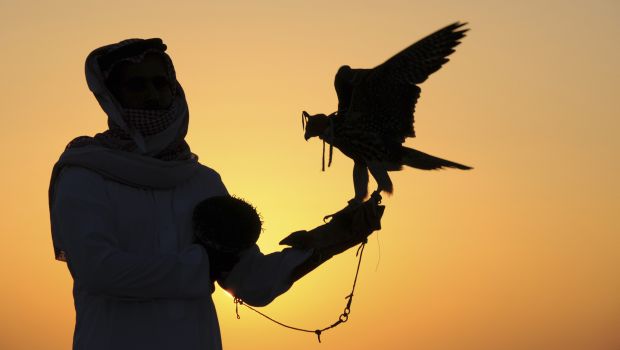Falconers from all the Arab states know Mujairema because of the many different species of falcon that pass through the area during the spectacular annual migration from Siberia to North Africa, with some species travelling as far away as Latin America.
One of the falconers gathering in the small village this year, Sa’eed Al-Amoudi from Al-Laith, a town 110 miles (180 kilometers) south of Jeddah, told Asharq Al-Awsat that one of the highlights of the annual gathering is getting to know people from neighboring towns and from countries around the Gulf.
A fan of the sport for 15 years, Amoudi added that there is a “wonderful” atmosphere and that is lots of cooperation and sharing among the falconers who gather there.
Mohamed Kawari, a Qatari falconer, told Asharq Al-Awsat that Mujairema has become a “place of culture, where we all meet and discuss the developments and problems that could emerge in the habitat of these birds and try to find solutions.”
One man from Kuwait, Nezar Ghali, even said that he takes his annual leave in November so he can travel to the Saudi village to practice falconry.
He told Asharq Al-Awsat that “falconers from different countries have a customary law that asks them to respect others and cooperate with one another,” saying this attitude has made Mujairema a “civilized” place where it’s easy to make friends.
To many falconers, however, the annual gathering is a chance to make not just friends, but also money: one Lanner Falcon was sold for USD 60,000 at auction last month, and prices for the prized birds start at USD 15,000. Sometimes, falcons are bartered for luxury goods like cars. In the past few years, some species of falcon have been sold for over USD 200,000.
Mohamed Al-Balawi, a seasoned falconer from northern Saudi Arabia, said there are many different ways to capture falcons, and just as much special equipment. There are “traps and nets for hunting doves, and others for quail, other other nets that are fixed on the ground.” Falconry tools also include “[live] doves and quails used for bait, and hounds used for hunting rabbits and deer in places that are not nature reserves.”
But he cautioned that “falconers must avoid the use of weapons of any kind.”
Sa’eed Al-Amoudi, the falconer from Al-Laith, described two of the methods used to catch falcons to Asharq Al-Awsat.
In the cottage hunting method, “A falconer uses a light wooden or mud box, propped up by a stick, and a dove or quail is placed underneath. Whenever a falcon approaches the trap to eat the prey, the falconer should pull the rope smoothly until the box falls to entrap the bird.”
The night hunting method is a lot more work for the falconer. “Two falconers wait until it is dark, and then one of the two falconers must shine a strong light into the falcon’s eyes from a distance of nearly 100 meters [330 feet] in order to capture its full attention,” said Amoudi. “Then, the other falconer must advance from the side. Usually, he takes off his shoes and all his clothes except his underwear so he doesn’t make any noise while sneaking up on the bird. Finally, the falconer pounces on the bird and captures it with both hands.”
Perhaps the agility and speed needed to catch a falcon in that way is what let Majed Rakan, who has been falconing for nearly 40 years, to say that it is “not a sport for fat men, unless they’re just watching. This is only for skinny people, because they’re able to run after birds more quickly.”

